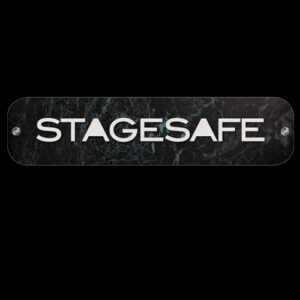
There are two words that are currently on everyone’s lips in the world of event safety and they are: stress and fatigue. Problems arise when work pressure and an always-on lifestyle starts to get on top of you, or if you’re not receiving adequate support or time for your mental-health needs.
The music industry certainly isn’t the only sector where these issues exist, but it’s a good thing that they’re being talked about more often, breaking down the stigma around discussing well being and mental health.
In the last few years there have been a few too many suicides among touring crew. There is hardly anyone in the professional touring world who has not been exposed to someone who has committed suicide. Stress goes hand in hand with depression and depression is a mental illness. Unfortunately this often carries the unwanted and unwarranted stigma surrounding it.
There is also the general stress involved with being a freelancer. Running your own business is incredible pressure. This can include financial insecurity, the uncertainty of not knowing if and where the next job is going to come from, being away from home and family, not being able to take time off for illness, etc. and the fact that if you’re not working, you’re not earning.
Stress can lead to many other personal issues; lack of confidence and self-esteem, loneliness and possible reliance on cigarettes, drinking or recreational drugs. I know from personal experience just how debilitating stress and depression can be. A lack of work, financial problems and a major illness brought me stress that quickly led to a depression and compounded other problems for me. It made me very dysfunctional. I was in a circle that was very hard to break.
Support from family, friends and work colleagues is so very important in this situation. The Government in the UK is now advocating Mental Health First Aiders be in every workplace in just the same way as employers are already legally obliged to ensure ordinary first aid facilities. This may hopefully also become a legal requirement soon.
There are now a number of support organisations and providers of mental health first aid training including the Rethink Mental Illness Advice Line and Mental Health First Aid England (MHFA) and of course, the NHS. I recommend getting trained and if you or somebody you know needs help, get them to see their own GP or call one of these organisations. Nobody should be alone.
Fatigue is a general term used to describe a wide variety of conditions but is generally accepted as feeling very tired, weary or sleepy as a result of insufficient sleep, prolonged mental or physical work, or extended periods of stress or anxiety. Boring or repetitive tasks can intensify feelings of fatigue. Fatigue can also be described as either acute (usually reversed by sleep and relaxation) or chronic (the constant, severe state of tiredness not relieved by rest).
There is a legal duty on employers to manage any risks from fatigue that arise from work. Fatigue needs to be managed, like any other hazard, through risk assessment and risk management. Simply complying with the Working Time Regulations alone is insufficient to manage the risks of fatigue.
Measuring fatigue levels is not easy as it varies from person to person; therefore, it is difficult to isolate the actual effect of fatigue on accident and injury rates in the business.
Some research studies have shown that when workers have slept for less than five hours before work or when workers have been awake for more than 16 hours, their chance of making mistakes at work due to fatigue is significantly increased.
Further, reports indicate that most accidents occur when people are most likely to want sleep, i.e. between midnight and 6 am, and between 1 pm and 3 pm.
As with almost all safety issues, prevention is far better than trying to cure in every situation and employers have a responsibility to take care of their staff. It is common to see poor working conditions and poor on-site accommodation at festivals where the crew are expected to live in tents with poor sanitation.
The other issue is that the touring and festival production technicians and even production managers don’t want to be seen or heard to be objecting to dangerous or poor work conditions as they don’t want to be labelled as uncooperative or difficult. They want and need to work. They are between a rock and a very hard place.
We do have the working time regulations that can help us but they alone are not enough. Promoters, managers and agents don’t really think (or want to think) of the time constraints on the crew and the fatigue problems (especially with “back to back” shows on large production tours) when they are booking tours or filling festival slots. And the crew that then work the tour suffer the consequences.
Working when you are tired impairs your judgment just like drinking. You are not safe to work and mistakes are easily and quickly made. Fatigue is a foreseeable problem and therefore has to be risk assessed, safety controls must be put in place and budgeted for!
Production managers can look at a schedule in advance and see the problems. The word NO should be used on these occasions but it’s a dilemma as you don’t want to upset your client but you also have your legal duties under health and safety regulations. Ignorance is no excuse but I hear so many that just resign themselves to not being able to do anything about the problem, they need the work and are not in a financial position to just walk away. The ones who work the hardest are often the ones most exploited and the ones in most need of help.

Safety: The Show Must Go On – Or Does It?
Redundancy in Theatrical Systems


With the benefit of over 35 years' experience, STAGESAFE offers a full range of award-winning and fully professional health and safety services. Our services are for event organisers, production and tour managers, promoters, freelancers, service companies and businesses at every level within the live music, event and entertainment industries. STAGESAFE is the trading name for Chris Hannam. We are not lawmakers or the fun police – we simply offer totally independent professional health and safety advice and services to help you run your event or business in a safe and legal manner. Just the mention of the words "health and safety" often conjures up negative images of over-zealous ‘jobsworth's', getting in the way of business, and creating unnecessary costs. It is easy to see why this is the case, with the press often reporting inaccurate stories about activities being banned on “health and safety” grounds, or with the words ‘health and safety' often being used as a poor excuse when people don't want something to happen. We do not provide Production or Event Management services as this would be a major conflict of interest to our health and safety management services, for tours and events. Health and safety advisors must be impartial and should have no other role or function outside of their health and safety duties and must have time to carry out these duties even in an emergency. We have a whole team of specialists to call on when required such as rigging, noise and pyro specialists, we also believe in a practical and pragmatic approach with everything delivered to you simply in bite-sized chunks, to enable easy implementation without any jargon so even the least experienced event organisers have nothing to fear or misunderstand. No more confusion, we make it simple for you.
Read Full Profile© 2021 TheatreArtLife. All rights reserved.

Thank you so much for reading, but you have now reached your free article limit for this month.
Our contributors are currently writing more articles for you to enjoy.
To keep reading, all you have to do is become a subscriber and then you can read unlimited articles anytime.
Your investment will help us continue to ignite connections across the globe in live entertainment and build this community for industry professionals.